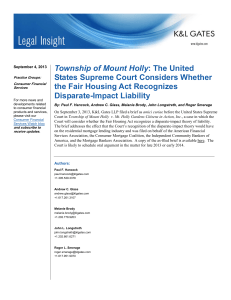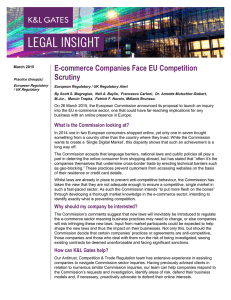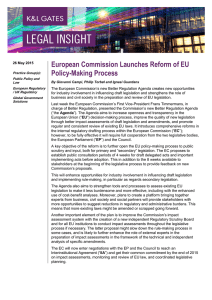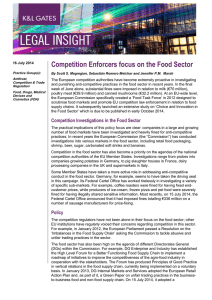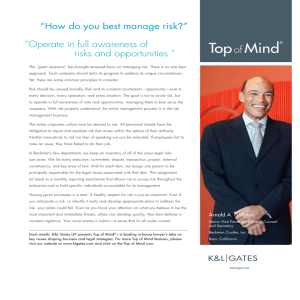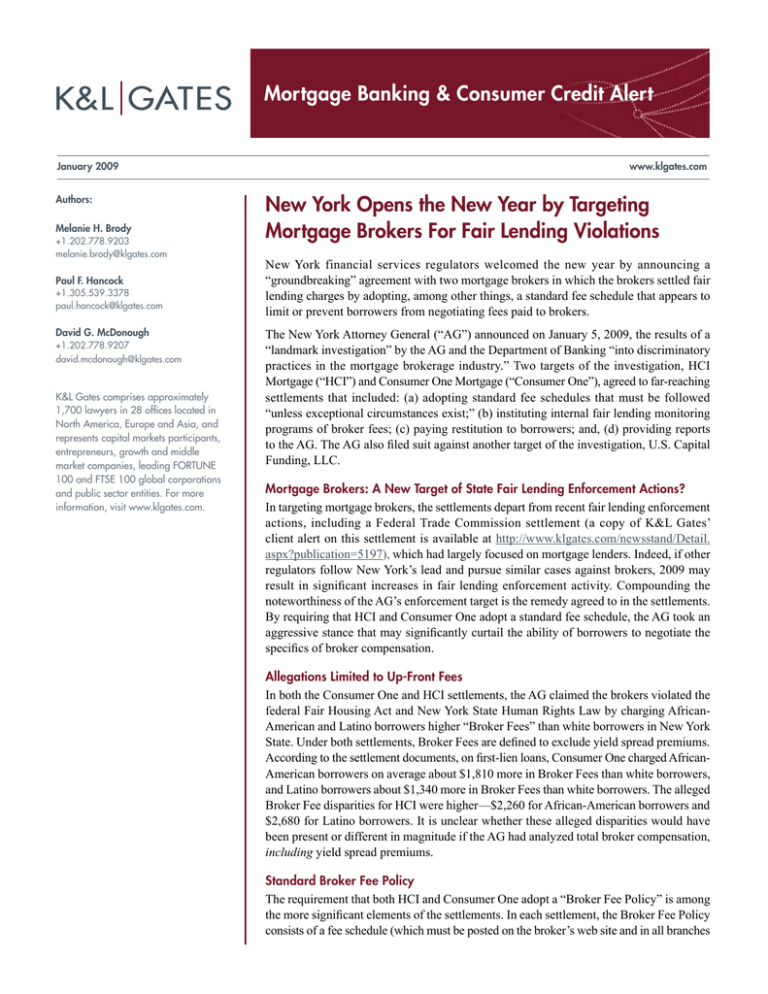
Mortgage Banking & Consumer Credit Alert
January 2009
Authors:
Melanie H. Brody
+1.202.778.9203
melanie.brody@klgates.com
Paul F. Hancock
+1.305.539.3378
paul.hancock@klgates.com
David G. McDonough
+1.202.778.9207
david.mcdonough@klgates.com
K&L Gates comprises approximately
1,700 lawyers in 28 offices located in
North America, Europe and Asia, and
represents capital markets participants,
entrepreneurs, growth and middle
market companies, leading FORTUNE
100 and FTSE 100 global corporations
and public sector entities. For more
information, visit www.klgates.com.
www.klgates.com
New York Opens the New Year by Targeting
Mortgage Brokers For Fair Lending Violations
New York financial services regulators welcomed the new year by announcing a
“groundbreaking” agreement with two mortgage brokers in which the brokers settled fair
lending charges by adopting, among other things, a standard fee schedule that appears to
limit or prevent borrowers from negotiating fees paid to brokers.
The New York Attorney General (“AG”) announced on January 5, 2009, the results of a
“landmark investigation” by the AG and the Department of Banking “into discriminatory
practices in the mortgage brokerage industry.” Two targets of the investigation, HCI
Mortgage (“HCI”) and Consumer One Mortgage (“Consumer One”), agreed to far-reaching
settlements that included: (a) adopting standard fee schedules that must be followed
“unless exceptional circumstances exist;” (b) instituting internal fair lending monitoring
programs of broker fees; (c) paying restitution to borrowers; and, (d) providing reports
to the AG. The AG also filed suit against another target of the investigation, U.S. Capital
Funding, LLC.
Mortgage Brokers: A New Target of State Fair Lending Enforcement Actions?
In targeting mortgage brokers, the settlements depart from recent fair lending enforcement
actions, including a Federal Trade Commission settlement (a copy of K&L Gates’
client alert on this settlement is available at http://www.klgates.com/newsstand/Detail.
aspx?publication=5197), which had largely focused on mortgage lenders. Indeed, if other
regulators follow New York’s lead and pursue similar cases against brokers, 2009 may
result in significant increases in fair lending enforcement activity. Compounding the
noteworthiness of the AG’s enforcement target is the remedy agreed to in the settlements.
By requiring that HCI and Consumer One adopt a standard fee schedule, the AG took an
aggressive stance that may significantly curtail the ability of borrowers to negotiate the
specifics of broker compensation.
Allegations Limited to Up-Front Fees
In both the Consumer One and HCI settlements, the AG claimed the brokers violated the
federal Fair Housing Act and New York State Human Rights Law by charging AfricanAmerican and Latino borrowers higher “Broker Fees” than white borrowers in New York
State. Under both settlements, Broker Fees are defined to exclude yield spread premiums.
According to the settlement documents, on first-lien loans, Consumer One charged AfricanAmerican borrowers on average about $1,810 more in Broker Fees than white borrowers,
and Latino borrowers about $1,340 more in Broker Fees than white borrowers. The alleged
Broker Fee disparities for HCI were higher—$2,260 for African-American borrowers and
$2,680 for Latino borrowers. It is unclear whether these alleged disparities would have
been present or different in magnitude if the AG had analyzed total broker compensation,
including yield spread premiums.
Standard Broker Fee Policy
The requirement that both HCI and Consumer One adopt a “Broker Fee Policy” is among
the more significant elements of the settlements. In each settlement, the Broker Fee Policy
consists of a fee schedule (which must be posted on the broker’s web site and in all branches
Mortgage Banking & Consumer Credit Alert
and offices) containing three components: a Standard
Processing Fee, a Standard Application Fee, and a
Standard Broker Service Fee. The HCI and Consumer
One settlements treat the first two fees in an identical
manner. Specifically, in both instances the fees must
be expressed as a lump sum, and deviations from the
standard fees are only allowed under “exceptional
circumstances” that must be documented in the loan
file and approved, in writing, by the branch manager.
The settlements provide two examples of such
exceptional circumstances: “identification of a cloud
on the property’s title” and “a change in the condition
of the property that affects its estimated value.” While
these examples appear to be merely illustrative, it is not
clear what other circumstances could be characterized
by the AG as “exceptional.”
In both settlements, the term “Standard Broker Service
Fee” essentially entails all up-front fees unrelated to
processing and application. For both settlements, the
Standard Broker Service Fee must be expressed in the
fee schedule as a percentage of the loan amount and may
vary for different loan amount ranges and for different
types of loans that require more work by the broker
(e.g., non-conforming mortgage loans, adjustable rate
mortgage loans). Beyond these similarities, however,
the two settlements vary in allowable departures from
the Standard Broker Service Fee.
For Consumer One, the settlement authorizes
downward-only departures from the Standard Broker
Service Fee “if such a fee reduction is necessary to
compete with an offer made to the customer by another
mortgage brokerage company that is in writing and
presented to Consumer One.” This limitation appears
to recognize that competition can be important in
establishing loan level broker compensation, but
arguably constrains to specific circumstances Consumer
One’s ability to respond to borrower negotiation. For
example, if a borrower verbally indicates that he/she
has a competing offer, but does not present proof of
the offer in writing, the settlement would not permit
Consumer One to reduce its fee to keep the deal.
Moreover, the Consumer One settlement imposes
a novel recordkeeping and disclosure obligation.
Specifically, the settlement requires for every loan,
regardless of any departure from the Standard Broker
Service Fee, that the company document in the loan
file the services performed in connection with the loan
and, more notably, the “amount of time the [b]roker
spent working on each task performed in connection
with the [l]oan.” In this regard, Consumer One must
“disclose in writing to the consumer the total amount
of time spent arranging the [l]oan.”
For HCI, the AG appears to have taken a different
stance and authorizes departures of up to 20 percent in
the Standard Broker Service Fee where the “nature of
the mortgage brokerage services provided in connection
with the [loan at issue] is substantially different from
the services provided in connection with similar [l]
oans ... .” In this regard, the HCI settlement requires
HCI to document in the loan file: “(i) the services
provided in connection with the [l]oan; (ii) why such
services justify a departure from the Standard Broker
Fee; and (iii) the amount of time the [b]roker spent
working on each task performed in connection with
the [l]oan.” Absent from this discussion of allowable
departures, however, are instances where the borrower
presents to HCI a loan offer from another broker (or
lender) that contains lower up-front fees. This absence
is remarkable for two reasons. First, the AG expressly
authorized downward departures based on competition
in its settlement with Consumer One. Second, by only
authorizing departures from HCI’s standard schedule
based on variations in the nature of services provided,
the settlement appears to prohibit any direct negotiation
between HCI and a borrower concerning up-front
fees.
The AG also authorized in the HCI settlement a small
category of allowable downward departures from
the Standard Broker Service Fee. Specifically, the
settlement provides that where a “customer clearly
expresses a desire to pay a higher yield spread
premium, which will result in a higher APR for the
[l]oan, in exchange for paying a Broker Service Fee
lower than the Standard Broker Service Fee” HCI may,
with specified additional disclosures, depart from the
Standard Broker Service Fee.
Monitoring
Both settlements require the brokers to monitor for
Broker Fee disparities. The monitoring requirements
contain a number of noteworthy elements. First, under
both agreements, “appropriate follow-up action” is
required if there is a statewide or branch office Broker
Fee disparity of more than 20 basis points for AfricanAmerican or Latino borrowers. It is unusual for a
settlement agreement to spell out specific basis point or
dollar amount thresholds requiring responsive action.
The mortgage lending industry has struggled with
January 2009 | 2
Mortgage Banking & Consumer Credit Alert
establishing monitoring thresholds, and regulators have
been reticent to provide specific guidance on the issue.
Although the AG’s settlements with Consumer One and
HCI provide a benchmark threshold for consideration,
establishing monitoring thresholds requires an analysis
of a variety of factors. Lenders and brokers will still
need to evaluate carefully their specific circumstances
when setting price monitoring thresholds.
The monitoring provisions in both settlements require
the brokers to make refunds to applicable borrowers
if their average statewide disparities for AfricanAmerican or Latino borrowers exceed 30 basis points.
Again, the lending industry has long struggled with
whether refunds based on statistical disparities are
advisable. On the one hand, certain regulators now
require their institutions to make refunds in such
cases, and many industry members believe that issuing
refunds is appropriate and more cost effective than
expending the time and resources to seek explanations
for statistical disparities. On the other hand, while
statistical disparities can signal the presence of potential
fair lending risk, most fair lending practitioners agree
that statistics alone—without further investigation—
should not be viewed as proof of discriminatory
conduct. As a result, and for a number of other reasons,
many are reticent to issue refunds based on statistical
disparities alone.
Finally, the HCI settlement provides that the broker
shall not be required to issue refunds if the Broker Fee
disparities can be “fully explained” through statistical
regression analyses that control for race- and ethnicneutral characteristics that could potentially impact
the amount of time and effort that the broker takes to
arrange loans. The settlement spells out the control
factors that may be used in such analyses: loan amount,
whether the loan is non-conforming, loan purpose,
credit score, debt-to-income ratio, loan-to-value
ratio, lien status, documentation level, property type,
loan date, occupancy status, number of applicants,
and employment status. This is noteworthy in that it
reflects at least one enforcement authority’s views on
appropriate control factors in broker compensation
models.
***
Although not binding on parties other than Consumer
One and HCI, the AG’s settlements provide useful
insights into how New York’s current attorney general
views the application of fair lending laws to mortgage
broker compensation. If you have any questions
about the AG’s settlements, please contact Melanie
Brody, Paul Hancock, David McDonough or any
other member of K&L Gates’ mortgage banking and
consumer finance group.
January 2009 | 3
Mortgage Banking & Consumer Credit Alert
K&L Gates’ Mortgage Banking & Consumer Finance practice provides a comprehensive range of transactional,
regulatory compliance, enforcement and litigation services to the lending and settlement service industry.
Our focus includes first- and subordinate-lien, open- and closed-end residential mortgage loans, as well as
multi-family and commercial mortgage loans. We also advise clients on direct and indirect automobile, and
manufactured housing finance relationships. In addition, we handle unsecured consumer and commercial
lending. In all areas, our practice includes traditional and e-commerce applications of current law governing
the fields of mortgage banking and consumer finance.
For more information, please contact one of the professionals listed below.
LAWYERS
Boston
R. Bruce Allensworth
Irene C. Freidel
Stephen E. Moore
Stanley V. Ragalevsky
Nadya N. Fitisenko
Brian M. Forbes
Andrew Glass
Phoebe Winder
bruce.allensworth@klgates.com
irene.freidel@klgates.com stephen.moore@klgates.com stan.ragalevsky@klgates.com nadya.fitisenko@klgates.com brian.forbes@klgates.com andrew.glass@klgates.com phoebe.winder@klgates.com
+1.617.261.3119
+1.617.951.9154
+1.617.951.9191
+1.617.951.9203
+1.617.261.3173
+1.617.261.3152
+1.617.261.3107
+1.617.261.3196
john.culver@klgates.com
+1.704.331.7453
thomas.poletti@klgates.com
+1.310.552.5045
paul.hancock@klgates.com +1.305.539.3378
phil.cedar@klgates.com
elwood.collins@klgates.com
steve.epstein@klgates.com
drew.malakoff@klgates.com +1.212.536.4820
+1.212.536.4005
+1.212.536.4830
+1.216.536.4034
jonathan.jaffe@klgates.com erin.murphy@klgates.com +1.415.249.1023
+1.415.249.1038
holly.towle@klgates.com +1.206.370.8334
costas.avrakotos@klgates.com melanie.brody@klgates.com dan.crowley@klgates.com eric.edwardson@klgates.com anthony.green@klgates.com steven.kaplan@klgates.com phillip.kardis@klgates.com rebecca.laird@klgates.com +1.202.778.9075
+1.202.778.9203
+1.202.778.9447
+1.202.778.9387
+1.202.778.9893
+1.202.778.9204
+1.202.778.9401
+1.202.778.9038
Charlotte
John H. Culver III
Los Angeles
Thomas J. Poletti
Miami
Paul F. Hancock
New York
Philip M. Cedar
Elwood F. Collins
Steve H. Epstein
Drew A. Malakoff
San Francisco
Jonathan Jaffe
Erin Murphy
Seattle
Holly K. Towle
Washington, D.C.
Costas A. Avrakotos Melanie Hibbs Brody
Daniel F. C. Crowley
Eric J. Edwardson Anthony C. Green
Steven M. Kaplan
Phillip John Kardis II
Rebecca H. Laird
January 2009 | 4
Mortgage Banking & Consumer Credit Alert
Laurence E. Platt
Phillip L. Schulman
H. John Steele Ira L. Tannenbaum
Nanci L. Weissgold
Kris D. Kully Morey E. Barnes
David L. Beam
Emily J. Booth Holly Spencer Bunting
Krista Cooley
Elena Grigera
Melissa S. Malpass
David G. McDonough, Jr.
Stephanie C. Robinson
Kerri M. Smith
David Tallman
larry.platt@klgates.com phil.schulman@klgates.com john.steele@klgates.com ira.tannenbaum@klgates.com nanci.weissgold@klgates.com kris.kully@klgates.com morey.barnes@klgates.com
david.beam@klgates.com emily.booth@klgates.com holly.bunting@klgates.com krista.cooley@klgates.com elena.grigera@klgates.com
melissa.malpass@klgates.com
david.mcdonough@klgates.com stephanie.robinson@klgates.com kerri.smith@klgates.com david.tallman@klgates.com +1.202.778.9034
+1.202.778.9027
+1.202.778.9489
+1.202.778.9350
+1.202.778.9314
+1.202.778.9301
+1.202.778.9215
+1.202.778.9026
+1.202.778.9112
+1.202.778.9853
+1.202.778.9257
+1.202.778.9039
+1.202.778.9081
+1.202.778.9207
+1.202.778.9856
+1.202.778.9445
+1.202.778.9046
stacey.riggin@klgates.com +1.202.778.9202
Director of Licensing
Washington, D.C.
Stacey L. Riggin
Regulatory Compliance Analysts
Washington, D.C.
Dameian L. Buncum
Teresa Diaz
Jennifer Early
Robin L. Gieseke
Allison Hamad
Joann Kim
Brenda R. Kittrell
Dana L. Lopez
Patricia E. Mesa
Jeffrey Prost
dameian.buncum@klgates.com teresa.diaz@klgates.com jennifer.early@klgates.com robin.gieseke@klgates.com allison.hamad@klgates.com
joann.kim@klgates.com brenda.kittrell@klgates.com dana.lopez@klgates.com patty.mesa@klgates.com
jeffrey.prost@klgates.com +1.202.778.9093
+1.202.778.9852
+1.202.778.9291
+1.202.778.9481
+1.202.778.9894
+1.202.778.9421
+1.202.778.9049
+1.202.778.9383
+1.202.778.9199
+1.202.778.9364
Anchorage Austin Beijing Berlin Boston Charlotte Dallas Fort Worth Frankfurt Harrisburg Hong Kong London Los Angeles
Miami Newark New York Orange County Palo Alto Paris Pittsburgh Portland Raleigh Research Triangle Park San Francisco
Seattle Shanghai Spokane/Coeur d’Alene Taipei Washington, D.C.
K&L Gates comprises multiple affiliated partnerships: a limited liability partnership with the full name K&L Gates LLP qualified in Delaware and
maintaining offices throughout the U.S., in Berlin, in Beijing (K&L Gates LLP Beijing Representative Office), and in Shanghai (K&L Gates LLP Shanghai
Representative Office); a limited liability partnership (also named K&L Gates LLP) incorporated in England and maintaining our London and Paris
offices; a Taiwan general partnership (K&L Gates) which practices from our Taipei office; and a Hong Kong general partnership (K&L Gates,
Solicitors) which practices from our Hong Kong office. K&L Gates maintains appropriate registrations in the jurisdictions in which its offices are
located. A list of the partners in each entity is available for inspection at any K&L Gates office.
This publication is for informational purposes and does not contain or convey legal advice. The information herein should not be used or relied upon
in regard to any particular facts or circumstances without first consulting a lawyer.
©2009 K&L Gates LLP. All Rights Reserved.
January 2009 | 5


